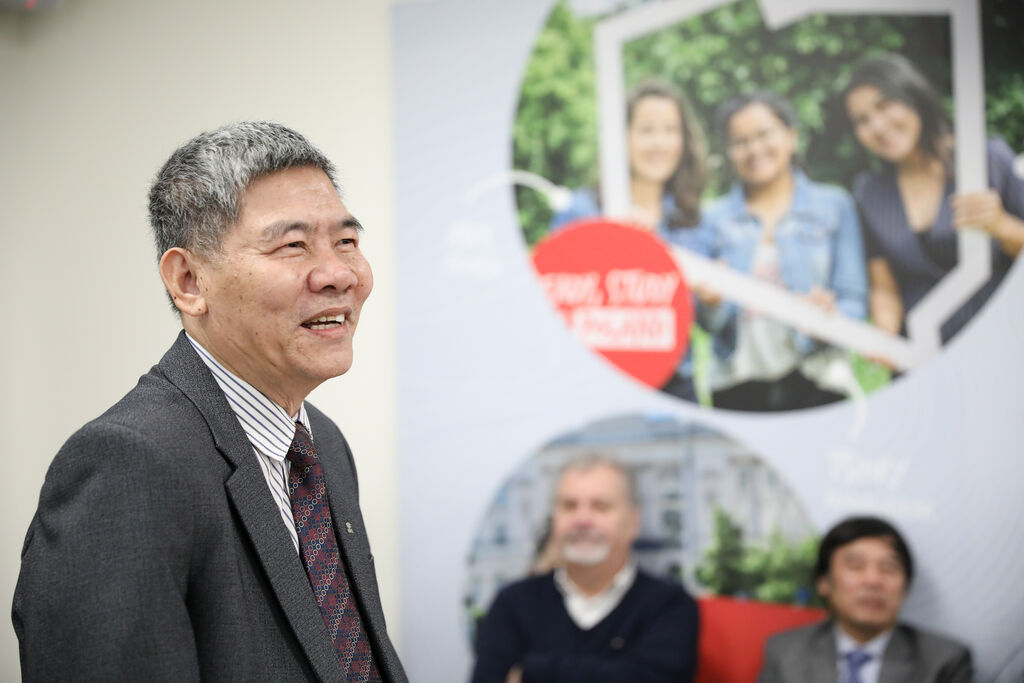We talk to Prof. Thuat Nguyen Chi from Adam Mickiewicz University in Poznań, a translator of Polish literature into Vietnamese, about how Polish can be attractive to foreigners and how to encourage them to learn it.
NAWA: What was your path to mastering Polish?
Prof. Thuat Nguyen Chi, Adam Mickiewicz University: The Vietnamese from my generation couldn’t choose what they would study. Who would study what was determined in advance. I was supposed to study Polish philology at the University of Lodz. When I received the news from the Vietnamese embassy, I was surprised, but also very happy about this assignment. Even though Polish philology was not my choice.
Why were you happy if you had no choice?
My dream of studying abroad was coming true. I was also glad that I would have to deal with Polish. I was good at Vietnamese at secondary school. In addition, I knew something about Poland from Vietnamese literature and I was fond of Poland as a country. I quickly grew to like Polish, among other things because it’s completely different from my mother tongue. Also, I understood quite soon that the command of that language would give me sort of a new life, that I would become richer thanks to Polish, acquiring one more culture and language. And so I have lived almost half a century now in Polish and in Vietnamese.
What do foreigners find appealing about the Polish language and culture?
For me, the allure of Polish is that the grammar and pronunciation are completely different than in my native language. And the Polish culture, albeit European, displays certain similarities with the Vietnamese culture.
For example?
Patriotism is very evident in Polish culture and literature. The Vietnamese can relate to that fairly easily, because, just like Poland, Vietnam too experienced wars and occupation. The Vietnamese understand the Poles very well when it comes to patriotism and freedom. That is why the Vietnamese have a particular fondness for the Poles.
What difficulties do foreigners encounter most often when they study Polish?
No foreign language is easy to learn. And Polish is deemed to belong to the group of the most difficult ones. The mere pronunciation, phonetics, is already a problem. Polish has two characteristic nasal vowels: ‘ą’ and ‘ę,’ which foreigners find difficult to pronounce. Then, the grammar is very complex because of the numerous exceptions. Next, there are cultural and social differences which are reflected in the language. Even when someone can speak Polish fairly well, they can come across a sentence in which they know all the words but can’t understand the sense.
What is the best way to promote Polish abroad and encourage people to study it?
A forte of the Polish language is that Polish literature is known worldwide. Poland can boast excellent writers, such as for instance Ryszard Kapuściński or several Nobel prize winners in literature. Now that Olga Tokarczuk has won the Nobel prize, the publishing houses in Vietnam are already planning to have her books translated.
Polish is also promoted abroad by faculties of Polish studies at universities and the network of Polish language teachers.
Another group of good ambassadors are foreign students who studied in Poland. I know Vietnamese people who studied Polish and contributed to the popularisation of Polish literature and culture in Vietnam after their return. They work among others at various state institutions or publishing houses. It is thanks to them that translations of Polish literature are published in Vietnam.
So how can we encourage young foreigners to take up Polish studies?
Of course, it’s a good idea to show Poland’s beauty, its geography, rich customs, cuisine. Yet what is most convincing for young people are the benefits the language can bring them on the labour market. The demand for the command of a foreign language other than the popular English grows if the economic cooperation between the relevant countries develops.
Thank you for your time.











 Prof. Thuat Nguyen Chi at a meeting with the Polonista Programme scholarship holders in February 2020 in Warsaw.
Prof. Thuat Nguyen Chi at a meeting with the Polonista Programme scholarship holders in February 2020 in Warsaw.